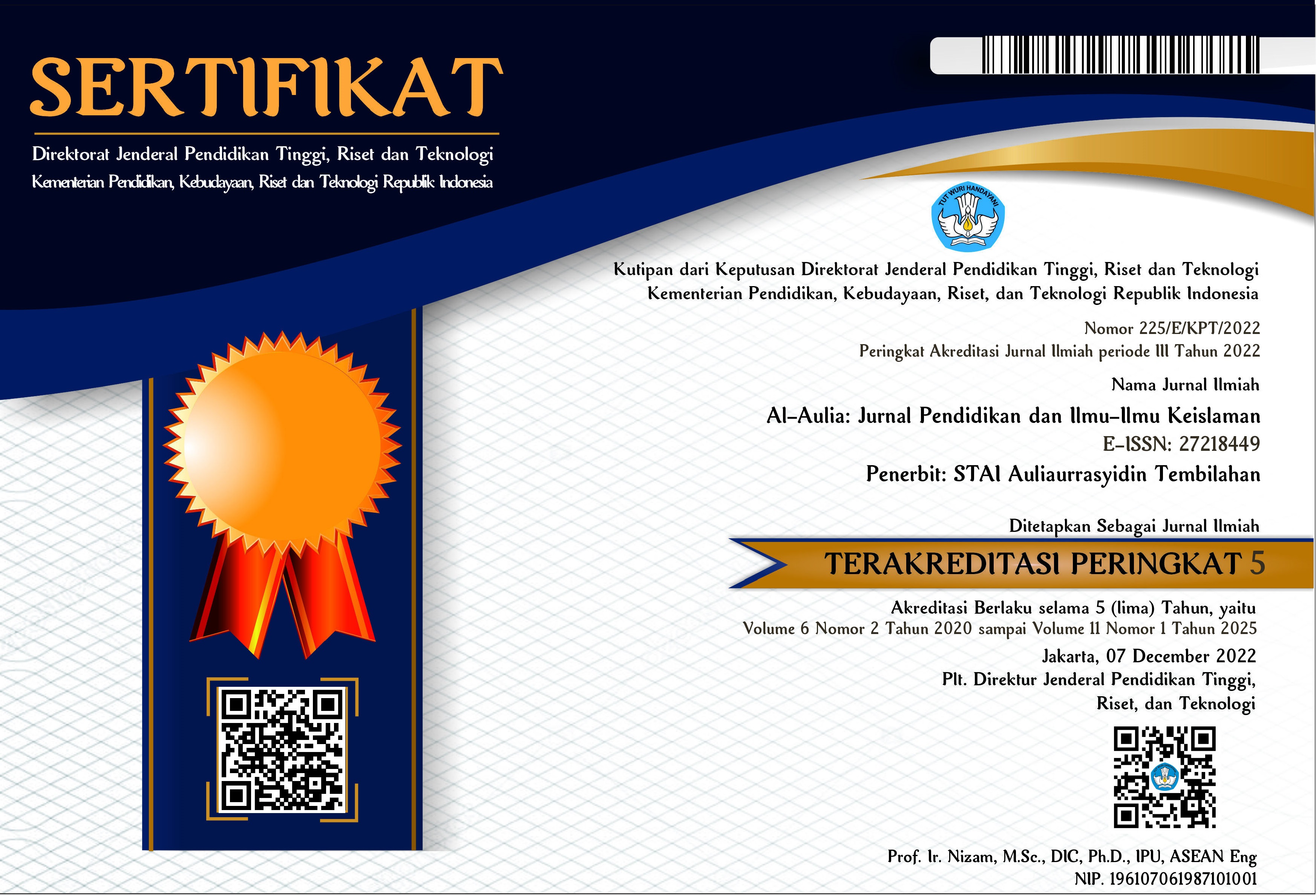Pendidikan Islam sebagai Problem Solver Mengatasi Dekadensi Moral Pelajar
DOI:
https://doi.org/10.46963/aulia.v9i1.892Keywords:
Education, Islam, MoralAbstract
Islam as a perfect religion and authentic li kulli wal eats (correct at all times and places) can certainly be a solution to all the problems of a nation. one of the problems of a nation is regarding the character of students who are increasingly losing the character that should be implemented in their daily life. Islam exists not only to deal with the vertical relationship between creatures and the Creator, but also in horizontal affairs, namely between fellow creatures. In Islam itself there are various educations, both aqidah, muamalah, morals and so on. An education must also have a mature concept and objectives in order to achieve the desired thing. In this article the focus is on discussing the objectives of Islamic education in the process of character building (character building). Descriptive approach and library research in this study really need to be done to look for facts and realities that exist, especially the purpose of Islamic education in building student character. The primary data source in this study is the Kapita Selekta Book on Islamic Education, and the secondary data are books, journals and scientific papers that are in accordance with the goals of Islamic education. From the results of this study, information was obtained that there were at least five basic methods for achieving the goals of Islamic education in building student character, namely: teaching, exemplary, setting priorities, priority praxis, and reflection.
References
Al-Asfahany, A.-r. (tt). Mu’jam Mufradat Alfadz Al-Qur’an. Beirut: dar al-Fikr.
Al-Baqi, M. F. (1992). al-Mu’jam al-Mufahras Li Alfaz al-Qur’an al-Karim. Beirut: Dar al-Fik.
Ali, H. N. (1999). Ilmu Pendidikan Islam. Jakarta: Logos.
Al-Nahlawi, ‘. a.-R. (1993). Usul al-Tarbiyyah al-Islamiyyah wa Asalibuha. Damaskus: Dar al-Fikr.
Al-Razi, F. (tt). Tafsir Fakhr al-Razi. Teheran: Dar al-Kutub al-‘Ilmiyyah.
Arifin, H. (2006). Ilmu Pendidikan Islam-Tinjauan Teoritis dan Praktis Berdasarkan Pendekatan Interdisipliner. Jakarta: Bumi Aksara.
Asnawan, U. d. (2017). Kapita Selekta Pendidikan Islam. Depok: Kencana.
Assingkily, M. S. (2021). Ilmu Pendidikan Islam; Mengulas Pendekatan Pendidikan Islam dalam Studi Islam dan Hakikat Pendidikan Bagi Manusia. Yogyakarta: K-Media.
Cresswill, J. W. (2014). Research design : qualitative, quantitative, and mixed methods approaches. USA: SAGE Publications.
Depdiknas. (2006). UU No. 20 Tahun 2003. Tentang system Pendidikan Nasional. Yogyakarta: Pustaka Pelajar.
Depdiknas. (2006). UU No. 20 Tahun 2003. Tentang system Pendidikan Nasional. Yogyakarta: Pustaka Pelajar.
Gunawan, H. (2014). Pendidikan Islam Kajian Teoritis dan Pemikiran Tokoh. Bandung: PT Remaja Rosdakarya.
Hadi, S. (1982). Metodologi Research. Yogyakarta: Yayasan Penerbitan Fakultas Psikologi UGM.
Hurlock, E. B. (1993). Perkembangan Anak . Jakarta: Erlangga.
Jalal, A. F. (1980). Azas-Azas Pendidikan Islam, terj. Noer Ali. Bandung: Diponegoro.
Jalaluddin. (2003). Teologi Pendidikan. Jakarta: PT Raja Grafindo Persada.
Langgulung, H. (1992). Asas-asas Pendidikan Islam. Jakarta: Pustaka Al-Husna.
Mandzur, I. (1990). Lisan al-‘Arab. Beirut: Dar Shadir.
Muhammad al-Naquib al-Attas,Terj. Haidar Bagir. (1996). The Concept of Education in Islam: A Frame Work for an Islamic Phylosophy of Education, . Bandung: Mizan.
Muhammad Fathurrohman, Sulistyorini, . (2012). Meretas Pendidikan Berkualitas dalam Pendidikan Islam. Yogyakarta: Teras.
Mukhlas dan Harianto Samani. (2013). Pendidikan Karakter. (Bandung: Remaja Rosdakarya.
Munir, A. (2008). Tafsir Tarbawi:Mengungkap Pesan-Pesan Al-Quran tentang Pendidikan. Yogyakarta: Teras.
Poerwadamanita, W. (1976). Kamus Umum Bahasa Indonesia. Jakarta: Balai Pustaka.
Ramdani. (2020). Upaya Guru Akidah AkhIak daIam Mengatasi Dekadensi MoraI Siswa di MA Negeri 1 Lebong. Program Studi Pendidikan Agama IsIam Jurusan Tarbiyah, Institut Agama IsIam Negeri ( IAIN) BengkuIu , 16.
Rianto, P. (2020). Modul Metode Penelitian Kualitatif. Yogyakarta: Penerbit Komunikasi UII.
Rush, A. I. (1998). Pemikiran Al-Ghazali Tentang Pendidikan Islam. Yogyakarta: Pustaka Pelajar.
Shihab, M. Q. (2007). Wawasan Al-Quran. Bandung: PT.Mizan Pustaka.
Siswanto. (2013). Dinamika Pendidikan Islam perspektif Historis. Surabaya: Pena Salsabila.
Sudirman dkk. (1987). Ilmu Pendidikan. Bandung: CF Remaja Karya.
Undang-Undang RI Nomor 20 Tahun 2003 tentang Sistem Pendidikan Nasional dan Undang Undang RI Nomor 14 tahun 2005 tentang Guru dan Dosen. (2007). Jakarta: Visi media.
Zed, M. (2008). Metode Penelitian Kepustakaan. Jakarta: Yayasan Obor Indonesia.
Downloads
Published
Issue
Section
License
Copyright (c) 2023 Andri Syahputra, Ellya Roza

This work is licensed under a Creative Commons Attribution-ShareAlike 4.0 International License.
Authors who publish with this journal agree to the following terms:
1. Copyright on any article is retained by the author(s).
2. The author grants the journal, right of first publication with the work simultaneously licensed under a Creative Commons Attribution License that allows others to share the work with an acknowledgment of the work’s authorship and initial publication in this journal.
3. Authors are able to enter into separate, additional contractual arrangements for the non-exclusive distribution of the journal’s published version of the work (e.g., post it to an institutional repository or publish it in a book), with an acknowledgment of its initial publication in this journal.
4. Authors are permitted and encouraged to post their work online (e.g., in institutional repositories or on their website) prior to and during the submission process, as it can lead to productive exchanges, as well as earlier and greater citation of published work.
5. The article and any associated published material is distributed under the Creative Commons Attribution-ShareAlike 4.0 International License







